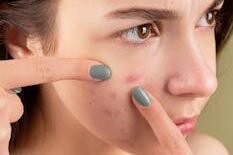Have you ever noticed dark spots lingering on your skin after a breakout, burn, or injury? If so, you might be dealing with post-inflammatory hyperpigmentation (PIH). While it’s not a permanent skin condition, the journey to recovery can feel long and frustrating. But don’t worry—there are ways to prevent it and speed up your recovery with simple remedies.
In this Article, we’ll dive into what PIH is, how it occurs, ways to prevent it, and some effective remedies to help your skin return to its natural glow.
What is Post-Inflammatory Hyperpigmentation (PIH)?
Post-inflammatory hyperpigmentation, or PIH, is a skin condition that causes dark patches or spots to appear after the skin has experienced some form of trauma or inflammation. Unlike acne scars, which involve changes in the skin’s texture, PIH is simply a discoloration. It’s not harmful, but it can be distressing, especially for those of us who want clear, even-toned skin.
How Does PIH Occur and What Does It Look Like?
When your skin experiences injury, like a pimple, rash, or even sunburn, it can trigger an inflammatory response. This inflammation can cause your body to produce an excess of melanin, the pigment that gives your skin its color. Unfortunately, instead of evenly distributing this melanin, your body deposits it unevenly in the affected area, leading to dark patches.
PIH often looks like flat spots on your skin that are darker than your natural skin tone. It can appear as brown, black, pink, or red, depending on your skin color and how recent the trauma was. If you’ve ever had a stubborn dark mark left behind after a pimple has healed, you’ve likely experienced PIH.
How to Prevent PIH
Preventing PIH begins with minimizing the chance of skin inflammation or trauma. Here are some key prevention tips:
1. Don’t Pick or Squeeze Pimples
One of the leading causes of PIH is picking at acne or blemishes. It’s tempting, but try to resist! Touching or popping pimples increases inflammation and skin trauma, making PIH more likely to form.
2. Use Sunscreen Daily
Sun exposure can worsen existing hyperpigmentation and trigger the formation of new dark spots. Apply a broad-spectrum sunscreen with at least SPF 30 every day, even if you’re indoors, to prevent sun damage that contributes to PIH.
3. Treat Inflammation Promptly
Whether it’s a pimple, rash, or irritation, treat inflammation as soon as possible with soothing products like aloe vera or anti-inflammatory creams. The quicker you reduce the inflammation, the lower the risk of developing PIH.
4. Incorporate Gentle Skincare
Avoid harsh scrubs, strong chemical peels, or aggressive treatments that may further irritate your skin. Opt for gentle cleansers and moisturizers that maintain your skin’s barrier and keep inflammation at bay.
5. Be Cautious with Heat
Excessive heat, whether from saunas, hot showers, or direct sun exposure, can lead to increased melanin production, which may worsen hyperpigmentation. Try to limit exposure to high heat, especially if you’re prone to PIH.
6. Keep Your Skin Hydrated
Hydrated skin is healthier and less prone to irritation. Use a good moisturizer to lock in hydration and support your skin’s healing process.
How to Recover from PIH
If you’re already dealing with PIH, don’t worry—there are ways to speed up recovery. Here are a few steps you can take:
1. Sun Protection
The sun is one of the biggest enemies when it comes to PIH. UV exposure can worsen hyperpigmentation by triggering more melanin production. Make sunscreen your best friend—apply at least SPF 30 daily, even if you’re indoors or it’s cloudy.
2. Exfoliation
Regular exfoliation helps remove dead skin cells, allowing the darker pigmented skin to shed and reveal fresh, brighter skin underneath. You can use gentle chemical exfoliants like AHAs (alpha hydroxy acids) or BHAs (beta hydroxy acids), which are great for tackling pigmentation.
3. Skin Brightening Ingredients
Incorporate ingredients like Vitamin C, niacinamide, and licorice extract into your routine. These have brightening properties that can help fade dark spots over time.
4. Retinoids
Retinoids are powerhouse ingredients that not only speed up cell turnover but also help lighten hyperpigmentation. However, they can be quite strong, so it’s best to consult with a dermatologist before starting.
Natural Remedies to Recover from PIH
If you prefer more natural remedies or want to supplement your skincare routine with gentle, home-based treatments, here are a few that can work wonders:
1. Aloe Vera
Aloe vera is famous for its anti-inflammatory and soothing properties. It can help reduce redness and calm inflamed skin, speeding up the healing process. Apply pure aloe vera gel directly onto the affected areas daily for the best results.
2. Licorice Extract
Licorice contains glabridin, which inhibits melanin production, making it a natural remedy for hyperpigmentation. You can find licorice extract in serums or create a DIY face mask by mixing it with honey.
3. Green Tea Extract
Green tea has powerful antioxidants that reduce inflammation and help lighten dark spots over time. Use products with green tea extract or brew some green tea and apply it to your skin using a cotton pad.
4. Coconut Oil
Coconut oil is another excellent remedy for PIH due to its moisturizing, anti-inflammatory, and healing properties. It helps soothe irritated skin and promotes the recovery of skin cells. Simply massage a small amount of virgin coconut oil onto the affected areas and leave it overnight for best results. Be mindful if you have acne-prone skin, as coconut oil may clog pores for some people.
5. Turmeric
Turmeric has long been used in skincare for its anti-inflammatory and skin-brightening properties. Mix turmeric powder with honey or yogurt to create a DIY mask, and apply it 2-3 times a week.
Special Tips for PIH Recovery
PIH may be stubborn, but with consistency, you can fade those dark spots and regain your skin’s glow. Here are a few additional tips to help you along the way:
- Be Consistent: Skincare requires time and dedication. Stick to a routine for at least 8-12 weeks before expecting visible results.
- Avoid Picking or Scratching: Picking at acne or scabs can worsen inflammation and increase the risk of PIH.
- Hydrate and Moisturize: Keeping your skin hydrated supports its healing process, making it easier for new, healthy skin cells to surface.
- Be Gentle: Avoid harsh scrubs or aggressive exfoliants that can irritate your skin further.
- Consult a Dermatologist: If your PIH is severe or not improving with over-the-counter treatments, it’s worth seeking professional advice for stronger treatments like chemical peels or laser therapy.
Conclusion
Post-inflammatory hyperpigmentation may take time to fade, but with the right approach, you can prevent it from worsening and speed up the healing process. Whether you’re using natural remedies like coconut oil, aloe vera, and turmeric, or opting for more potent skincare products, consistency is key. Be gentle, stay patient, and protect your skin from the sun to prevent further darkening.
By following these steps and tips, you’ll be well on your way to fading those dark spots and embracing clearer, more radiant skin!

